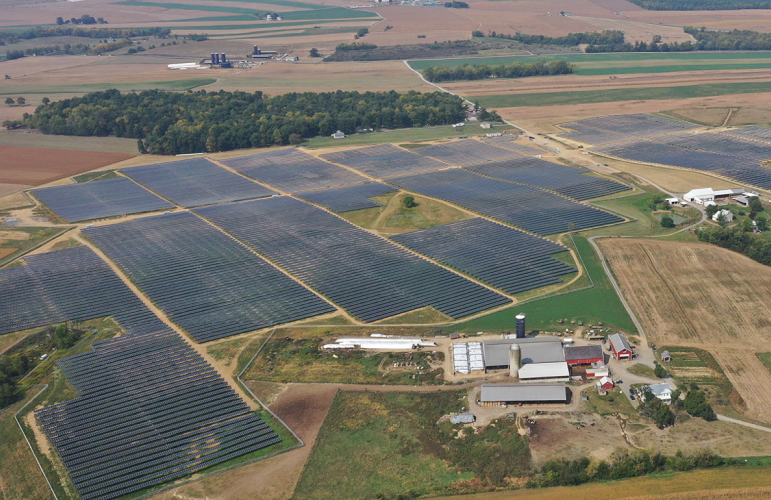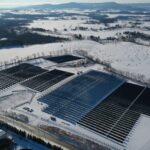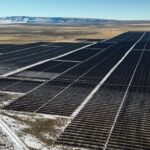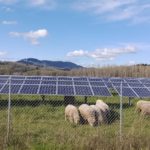Penn State’s 70-MW solar project portfolio is now producing power and supporting sheep grazing

Penn State University has begun purchasing renewable electricity generated from three Lightsource bp solar farms that have completed construction in Franklin County, Pennsylvania. The projects were initiated in 2019 upon the signing of a 70-MW PPA under which Penn State would purchase 100% of the electricity generated by the projects constructed and operated by Lightsource bp.
In total, the solar farms will supply 25% of the University’s state-wide electricity needs, providing Penn State with estimated cost savings in year one of $272,000 and more than $14 million over the 25-year contract term.
“At a time when we are facing so many great challenges, the beginning of this 25-year power purchase agreement offers a bright moment and a true reflection of the university’s ability and commitment to not just grow, but to succeed in a way that enhances the health and sustainability of the planet and future generations,” said David Gray, Vice President for Finance and Business and Treasurer, Penn State.
More than fifty Penn State students with a variety of majors, including business, engineering, and marketing have experienced, and will continue to have access to a variety of learning, research and internship opportunities related to the solar project.
“From planning to implementation and beyond, our students were granted firsthand, once-in-a-lifetime access to innovative learning and research opportunities related to the expanding renewable energy industry. These living lab experiences prepare students for new career possibilities, and a brighter future for all of us,” said Eric Barron, University President.
One group of senior engineering students worked with Lightsource bp through the University’s Bernard J. Gordon Learning Factory to design an interactive excel guide for wind and solar developers to pitch business marketing strategies to executives at Lightsource bp as part of their class with Karen Winterich, Professor and Smeal Research Fellow at the college. And during Fall 2019 semester, graduate researchers from multiple disciplines across the university toured the solar site as part of the LandscapeU program which studies the food-energy-water system in the Chesapeake Bay watershed and elsewhere.
“Having Penn State students involved in the project as well as contribute to our business strategy has been an added benefit,” said Kevin Smith, CEO of the Americas, Lightsource bp. “We’ve been impressed with their critical thinking and caliber of work.”
The three solar farms are on 500 acres of land leased from local landowners, providing a diversified, reliable cash flow in the local Pennsylvania farming community. Additionally, in partnership with Penn State, local farmers, ecology and grazing experts, Lightsource bp created a plan to enhance biodiversity as well as continue agricultural use through rotational sheep grazing to maintain the land and provide a supplemental source of income to local farmers.
Each of the three solar farms – called Nittany 1, 2 and 3 – were seeded with a specially formulated seed mix aptly named Fuzz & Buzz. Developed by the American Solar Grazing Association (ASGA) in partnership with Ernst Conservation Seeds and Pollinator Service, Fuzz & Buzz was specifically designed for solar sites to support grazing, and biodiverse enough to support a range of pollinators. In Pennsylvania, as well as around the world, habitat loss, disease and environmental contaminants have caused pollinator populations to decline, which has detrimental effects on food crops that rely on pollinators.
The Nittany 1 site will be the first to support grazing activities, to begin in Spring 2021. Sheep grazing will keep the farmland in farm production and employ Pennsylvania farmers. It can also improve soil health by increasing the cycling of nutrients, carbon and water.
“From the beginning of our partnership with Penn State, the focus has been on affordability and benefits to the community and environment. Penn State’s robust request for proposal (RFP) process could serve as a blueprint for other universities on how to maximize the positive impacts of an investment in renewable energy,” said Emilie Wangerman, VP of Business Development, Lightsource bp.
Original Source: https://www.solarpowerworldonline.com/2020/10/penn-states-70-mw-solar-project-portfolio-is-now-producing-power-and-supporting-sheep-grazing/















